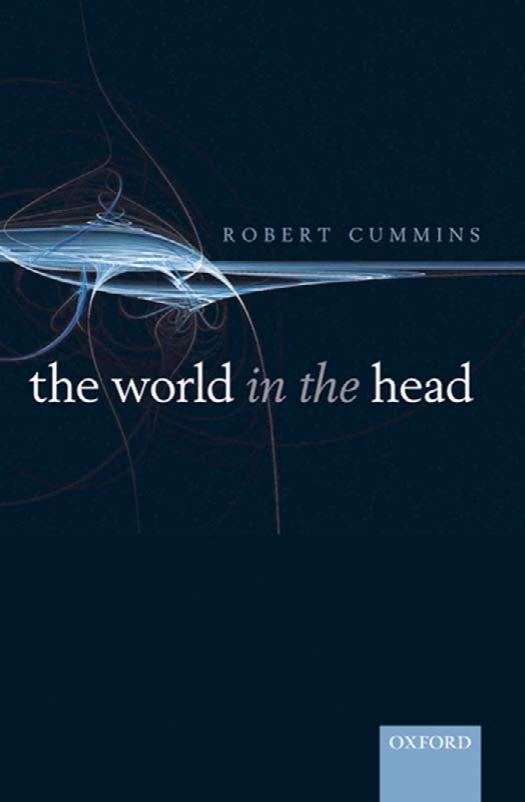The World in the Head by Robert Cummins

Author:Robert Cummins
Language: eng
Format: epub, pdf
ISBN: 9780191609466
Publisher: Oxford
11.8. Conclusion
So: what we need at the foundations of cognitive science is representation and indication, and we need the concept of unexploited content—content that is there to be exploited, but which the system has not yet learned or evolved to exploit. Content, in short, that is not a function of use.
We do not need psychosemantics as generally conceived. As this is usually conceived, it makes sense only in a BDI + LOT framework. But it is likely doomed even there, because the conventions governing the semantics of the sentences that express the contents of the propositional attitudes are, obviously, just the conventions governing the sentences of a natural language, and these are going to yield meanings—references and truth conditions—that do not match the non-convention governed mental/neural states that are, or should be, the bread and butter of cognitive science. You are not going to find an evolved natural content for every convention governed sentence or its constituents. Our language doesn’t reduce to Aristotle’s, let alone to an imagined language of thought that is presumed to differ little if at all from the code running in the brains of our Pleistocene ancestors.
What we do need (though not everyone would welcome it) is a scientific explanation of meaning. This we evidently do not have at present. But we think our prospects would improve if we were to conceive the problem as a problem about language and communication, and not as a problem about the contents of psychological states. The trend has been to derive linguistic and communicative meaning from something else, the contents of propositional attitudes. Sentences express propositions because they express thoughts. This, by itself, isn’t so bad. The trouble comes when we go on to think that thoughts, being the cogwheels of the mind, must have their propositional contents intrinsically, non-derivatively. Thoughts must be things having ‘natural’ (i.e. non-conventional) propositional contents. The conventions of language simply link linguistic expressions to intrinsically meaningful thoughts. We are now deeply committed to a BDI theory of the mind, and the LOT that goes with it. The concepts of representation and indication fundamental to the science of cognition get hijacked and pressed into service as grounders for meaning, and this grounding business becomes the goal of the theory of mental content. Linguistic meaning is then conceived as just LOT meaning worn by conventional symbols, and LOT meaning is just, well, functional role, or the role of primitive LOT symbols in detection, or... We completely lose sight, in philosophy, anyway, of the success that cognitive science has achieved in understanding such things as cognitive maps and edge detectors and visual images/maps. And we make our job seem easier than it is by failing to see the gap between meaning and content. It is a large gap, and it needs to be filled by something other than hand-waving.
Download
This site does not store any files on its server. We only index and link to content provided by other sites. Please contact the content providers to delete copyright contents if any and email us, we'll remove relevant links or contents immediately.
The Art of Thinking Clearly by Rolf Dobelli(8841)
Mindhunter: Inside the FBI's Elite Serial Crime Unit by John E. Douglas & Mark Olshaker(7833)
Change Your Questions, Change Your Life by Marilee Adams(6641)
Nudge - Improving Decisions about Health, Wealth, and Happiness by Thaler Sunstein(6633)
Mastermind: How to Think Like Sherlock Holmes by Maria Konnikova(6235)
The Power of Now: A Guide to Spiritual Enlightenment by Eckhart Tolle(4754)
Men In Love by Nancy Friday(4320)
Factfulness: Ten Reasons We're Wrong About the World – and Why Things Are Better Than You Think by Hans Rosling(4021)
The Confidence Code by Katty Kay(3566)
Thinking in Bets by Annie Duke(3531)
Man and His Symbols by Carl Gustav Jung(3315)
Three Women by Lisa Taddeo(2920)
The Worm at the Core by Sheldon Solomon(2917)
Why Buddhism is True by Robert Wright(2826)
Liar's Poker by Michael Lewis(2810)
The Inner Life of Animals by Peter Wohlleben(2765)
Descartes' Error by Antonio Damasio(2731)
The Power of Mindful Learning by Ellen J. Langer(2710)
The Slow Fix: Solve Problems, Work Smarter, and Live Better In a World Addicted to Speed by Carl Honore(2574)
